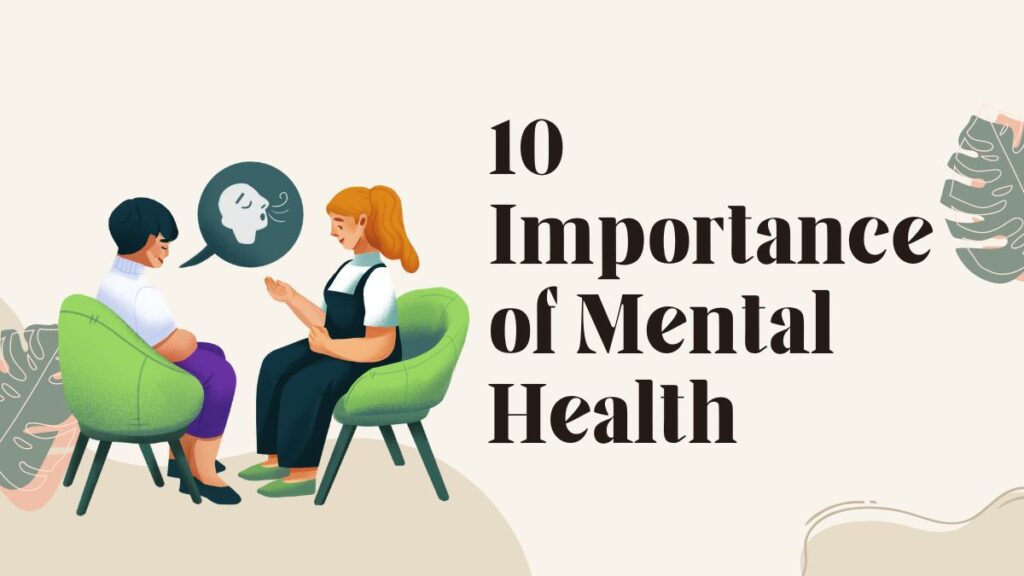Discover the top 10 importance of mental health. Boost your productivity, enrich your relationships, and find a happier version of yourself. Explore our guide now!
Imagine waking up feeling fully energized, driven, and eager to conquer the day ahead. You handle challenges with clarity and engage in relationships with calm confidence. This is the profound impact of good mental health.
It goes beyond mere problem avoidance; it empowers you to thrive in every aspect of life. Yet, mental health often gets sidelined. Before resigning yourself to another day of stress or disconnection, pause.
In this guide, we will explore 10 compelling reasons why prioritizing mental health is the greatest gift you can give yourself.
Importance of Mental Health for Students PDF
Understanding Mental Health
Mental health is essential for well-being, affecting how we think, feel, and behave. Mental health conditions disrupt these aspects of life.
Types
Anxiety: Excessive worry and fear.
Mood: Persistent mood changes.
Psychotic: Loss of contact with reality.
Eating: Unhealthy eating habits.
Personality: Maladaptive behavior patterns.
Common Signs
Emotional: Sadness, anxiety, anger.
Physical: Fatigue, sleep changes.
Behavioral: Social withdrawal, neglecting responsibilities.
Causes
Genetic, environmental, and lifestyle factors contribute.
Seeking Help
Professional support is crucial for diagnosis and treatment.
Diagnosis and Treatment
Understanding mental health conditions and their signs is crucial. Here’s what follows:
Diagnosis
Psychological evaluations and interviews.
Mental status exams to assess mood and behavior.
Standardized tests for symptom screening.
Review of medical history.
Use of diagnostic criteria like DSM-5.
Treatment Options
Psychotherapy (talk therapy) to address thoughts and coping skills.
Medications targeting brain chemistry.
Lifestyle adjustments for better sleep, diet, and exercise.
Innovative approaches like digital tools and mindfulness.
Social support and holistic practices like yoga.
Seeking help is a sign of strength. Many resources can support your mental health journey.
10 importance of mental health
Check out 10 importance of mental health:-
Enhancing Productivity
Maintaining good mental health enables sharper focus and wiser decision-making. For instance, incorporating daily routines or mindfulness practices can heighten efficiency, aiding in accomplishing tasks effectively at work or school.
Strengthening Relationships
Optimal mental health fosters effective communication and empathy. Being emotionally attuned can offer crucial support to friends in need, deepening interpersonal connections.
Boosting Emotional Well-being
Effectively managing stress cultivates inner tranquility. Engaging in activities like deep breathing or leisurely walks diminishes anxiety, uplifting overall mood.
Improving Physical Health
Prioritizing mental well-being positively impacts physical health. Adequate rest and stress management bolster the immune system, promoting vitality.
Increasing Self-Esteem
Sound mental health breeds self-assurance. Practicing self-care and setting realistic goals heighten self-esteem, aiding in overcoming challenges.
Fostering Healthy Coping Mechanisms
Developing positive stress management techniques is vital. Pursuits like painting or exercise offer rejuvenation and mental clarity after demanding days.
Enhancing Creativity
A healthy mindset invites innovation. Taking breaks and exploring diverse activities can inspire creativity, facilitating inventive problem-solving.
Elevating Quality of Life
Mental well-being enriches life’s pleasures. Finding happiness in simple joys and quality time with loved ones enhances overall well-being.
Reducing Stigma
Open dialogue about mental health diminishes societal stigma. Sharing personal experiences and offering support encourages seeking assistance and fostering a supportive community.
Empowering Personal Growth
Prioritizing mental health empowers personal development. Seeking counseling or joining support networks equips individuals with tools and motivation to surmount challenges and realize aspirations.
By nurturing your mental health, you pave the way to a more fulfilling life, stronger relationships, and resilience in facing life’s trials with optimism.
10 importance of mental health for students
Check out 10 importance of mental health for students:-
| Benefits of Good Mental Health | Description |
|---|---|
| Boosts Academic Performance | Good mental health helps students focus and understand their studies better. |
| Enhances Learning and Motivation | Mentally well students are more engaged in class and eager to learn. |
| Improves Emotional Control | It helps students manage stress and frustrations effectively. |
| Strengthens Social Relationships | Mental well-being improves relationships with peers and teachers. |
| Increases Self-Esteem | Feeling mentally strong boosts confidence and encourages participation. |
| Promotes Healthy Coping | Students learn to handle pressure in positive ways. |
| Improves Decision-Making | Clear thinking leads to better choices academically and socially. |
| Reduces Absences | Addressing mental health issues prevents missing school. |
| Creates a Positive Environment | A mentally healthy school benefits everyone. |
| Builds Resilience | Skills learned now prepare students for challenges later in life. |
By focusing on mental health, students can thrive academically and enjoy a positive school experience.
Importance of mental health in points
Check out importance of mental health in points:-
Personal Well-being
- Increases happiness and life satisfaction.
- Boosts emotional resilience.
- Improves sleep quality.
- Raises self-esteem and confidence.
- Enhances decision-making skills.
- Builds effective coping mechanisms.
- Strengthens relationships.
- Provides purpose and direction in life.
- Develops emotional intelligence.
- Reduces stress impact on health.
Physical Health
- Lowers risk of cardiovascular diseases.
- Boosts immune system function.
- Aids in faster recovery from illnesses.
- Reduces chronic pain.
- Improves longevity.
- Decreases substance abuse risks.
- Supports healthy lifestyle choices.
- Enhances physical performance.
- Slows cognitive decline.
- Reduces obesity risks.
Work and Productivity
- Increases productivity.
- Enhances creativity and innovation.
- Improves job satisfaction.
- Lowers absenteeism rates.
- Boosts leadership skills.
- Improves teamwork.
- Enhances focus and concentration.
- Strengthens problem-solving abilities.
- Promotes positive work environment.
- Supports career growth.
Education and Learning
- Improves academic performance.
- Enhances memory retention.
- Reduces test anxiety.
- Aids in better concentration.
- Strengthens critical thinking.
- Improves communication skills.
- Increases motivation to learn.
- Reduces behavioral issues.
- Enhances student-teacher relationships.
- Supports lifelong learning.
Social Relationships
- Improves communication and empathy.
- Strengthens bonds with family and friends.
- Reduces conflicts.
- Enhances parenting skills.
- Increases social connections.
- Provides emotional support.
- Improves romantic relationships.
- Reduces loneliness.
- Promotes acceptance of others.
- Fosters sense of belonging.
Economic and Socioeconomic Factors
- Lowers healthcare costs.
- Increases economic productivity.
- Reduces crime rates.
- Supports poverty reduction.
- Improves financial decision-making.
- Reduces reliance on social welfare.
- Enhances workplace diversity.
- Supports economic resilience.
- Reduces burden on healthcare.
- Promotes sustainable development.
Public Health and Policy
- Raises awareness of mental health.
- Reduces stigma and discrimination.
- Supports public health initiatives.
- Improves access to treatments.
- Strengthens mental health laws.
- Enhances crisis response.
- Promotes mental health research.
- Supports global health security.
- Reduces health disparities.
- Facilitates community interventions.
Cultural and Spiritual Well-being
- Supports cultural identity.
- Enhances spiritual growth.
- Facilitates mindfulness practices.
- Promotes cultural tolerance.
- Strengthens community resilience.
- Integrates traditional healing.
- Supports life transitions.
- Encourages storytelling.
- Promotes art therapy.
- Fosters cultural pride.
Environmental Impact
- Promotes eco-friendly behaviors.
- Reduces ecological footprint.
- Supports outdoor activities.
- Enhances environmental education.
- Facilitates eco-therapy.
- Reduces stress through nature.
- Enhances biodiversity awareness.
- Supports climate action.
- Encourages community gardening.
- Promotes sustainable tourism.
Technology and Digital Well-being
- Enhances digital literacy.
- Reduces digital addiction.
- Promotes positive online interactions.
- Supports mental health apps.
- Improves telemedicine access.
- Facilitates remote work.
- Increases online resources.
- Reduces cyberbullying.
- Supports ethical AI use.
- Promotes digital well-being.
Human Rights and Advocacy
- Upholds mental health rights.
- Advocates for vulnerable groups.
- Supports disability rights.
- Reduces discrimination.
- Enhances social justice.
- Promotes inclusive policies.
- Supports refugees’ mental health.
- Encourages cultural sensitivity.
- Empowers marginalized communities.
- Strengthens global partnerships.
Sports and Recreation
- Improves athletic performance.
- Enhances team dynamics.
- Reduces sports injuries.
- Supports recreational therapy.
- Promotes fair play.
- Boosts motivation.
- Facilitates stress relief.
- Reduces performance anxiety.
- Improves focus in sports.
- Supports lifelong activity.
Creative Arts and Expression
- Enhances creativity.
- Reduces stress.
- Supports art therapy.
- Improves self-awareness.
- Facilitates storytelling.
- Promotes community art.
- Celebrates diversity.
- Supports social activism.
- Fosters empathy.
- Celebrates cultural heritage.
Legal and Ethical Considerations
- Upholds confidentiality.
- Ensures informed consent.
- Promotes ethical practices.
- Reduces legal disputes.
- Enhances patient rights.
- Supports legal aid.
- Facilitates access to justice.
- Strengthens compliance.
- Promotes AI ethics.
- Encourages diversity.
Faith and Spirituality
- Supports spiritual growth.
- Enhances religious practices.
- Facilitates faith-based counseling.
- Promotes forgiveness.
- Provides comfort in grief.
- Fosters community.
- Integrates spiritual values.
- Reduces existential anxiety.
- Supports religious tolerance.
- Celebrates diversity.
Family Dynamics
- Improves parenting skills.
- Reduces family conflicts.
- Supports elderly care.
- Enhances emotional support.
- Facilitates family therapy.
- Promotes healthy boundaries.
- Reduces intergenerational trauma.
- Supports single parents.
- Enhances marital counseling.
- Celebrates family values.
Aging and Elder Care
- Supports cognitive health.
- Enhances elder quality of life.
- Reduces loneliness.
- Facilitates geriatric care.
- Promotes active aging.
- Supports caregiver well-being.
- Improves senior resources.
- Reduces age-related issues.
- Enhances dignity in aging.
- Celebrates wisdom.
Crisis Intervention and Disaster Management
- Enhances emergency resilience.
- Reduces post-disaster trauma.
- Supports trauma care.
- Facilitates crisis counseling.
- Promotes community recovery.
- Improves emergency response.
- Reduces long-term impacts.
- Enhances disaster planning.
- Supports first responders.
- Celebrates community support.
Global Health and Development
- Reduces global mental health burden.
- Supports sustainable development.
- Enhances cross-cultural efforts.
- Facilitates mental health in crises.
- Integrates mental health in healthcare.
- Reduces global disparities.
- Enhances global cooperation.
- Supports mental health workforce.
- Promotes cultural competence.
- Celebrates diversity.
These points aim to capture the essence of each category succinctly while highlighting the diverse benefits of prioritizing mental health.
why is mental health important for students
Why Mental Health Matters for Students:
Academic Success
Better focus and concentration improve grades and test scores.
Enhanced learning and motivation foster active participation and understanding.
Improved emotional regulation aids stress management and resilience.
Social and Emotional Well-being
Develops healthy coping mechanisms for academic pressures and social challenges.
Strengthens social connections through empathy and positive interactions.
Boosts self-esteem and confidence for active engagement and positive self-image.
Overall School Experience
Reduces absenteeism and boosts academic engagement.
Creates a positive school environment focused on community and well-being.
Builds resilience by equipping students to handle challenges beyond academics.
Mental health is essential for students to thrive academically, build relationships, and achieve their potential.
What are 5 reasons why mental health is important?
Key Reasons Why Mental Health is Important:
| Benefits of Good Mental Health | Description |
|---|---|
| Supports Overall Well-Being | Aids in managing stress effectively. |
| Helps Handle Challenges | Encourages a positive outlook in facing difficulties. |
| Improves Relationships | Enhances empathy and connections with others. |
| Enhances Joy and Purpose | Increases overall happiness and a sense of purpose in life. |
| Boosts Focus and Performance | Improves concentration and academic or professional performance. |
What are 5 ways to improve mental health?
Here are five simple ways to improve your mental health:
1. Prioritize Self-Care
Eat well, sleep 7-8 hours, and exercise.
Practice relaxation like deep breathing or meditation.
Set boundaries and say no when needed.
2. Connect with Others
Spend time with supportive loved ones.
Join clubs or volunteer to meet new people.
Consider therapy for extra support.
3. Stay Active
Exercise for 30 minutes most days with activities you enjoy.
4. Challenge Negative Thoughts
Use CBT techniques to reframe negative thoughts.
Practice daily gratitude.
5. Seek Help When Needed
Consult a therapist for professional support.
What are 5 benefits of mental health?
Here are the benefits of good mental health in a simpler format:
| Category | Benefits |
|---|---|
| Emotional Strength | Manage stress and negative emotions effectively. |
| Better Relationships | Improve communication and empathy. |
| Physical Health | Boost immune function and sleep quality. |
| Increased Productivity | Enhance focus and decision-making. |
| Life Satisfaction | Find purpose and joy in daily life. |
How can mental health affect your life?
Mental health affects every part of our lives. Here’s how:
| Category | Benefits |
|---|---|
| Emotions | Shapes mood: Good mental health fosters joy; poor mental health can lead to sadness. |
| Handles stress: Helps manage challenges without feeling overwhelmed. | |
| Relationships | Strengthens bonds: Promotes empathy and communication. |
| Boosts confidence: Improves social interactions. | |
| Physical well-being | Enhances overall health: Improves immune function and sleep quality. |
| Performance | Increases productivity: Improves focus and decision-making. |
| Fuels motivation: Encourages goal-setting and resilience. | |
| Quality of life | Enhances happiness: Adds fulfillment and purpose. |
| Builds resilience: Strengthens ability to handle life’s ups and downs. |
Prioritizing mental health is crucial for a happier, more fulfilling life.
Personal Stories and Case Studies
Check out personal stories and case studies:-
Personal Stories
NAMI: Real-life stories from people with mental health conditions. NAMI
The Mighty: Personal stories categorized by condition or experience. The Mighty
Heads Together: Stories from celebrities and regular individuals on mental health. Heads Together
Case Studies
APA: Studies on how professionals treat mental health conditions. APA
NIMH: Case studies on symptoms, diagnosis, and treatment. NIMH
Additional Resources
MentalHealth.gov: Government resources on mental health treatment and support. MentalHealth.gov
Crisis Text Line: Text HOME to 741741 for crisis counseling and resources.
These resources provide insights into mental health through personal stories and professional case studies.
Conclusion
Ensuring mental health isn’t a choice but a cornerstone of a fulfilling life. By delving into the 10 crucial aspects we’ve explored, you’re not just tackling problems; you’re nurturing resilience, fostering happiness, and unlocking your full potential.
Keep in mind, mental well-being is an ongoing voyage. There will be peaks and valleys, yet armed with proper tools and backing, you can navigate obstacles and embrace a life rich in joy, purpose, and profound relationships.
Take that initial stride now. Make your mental health a priority and watch every dimension of your life flourish.


